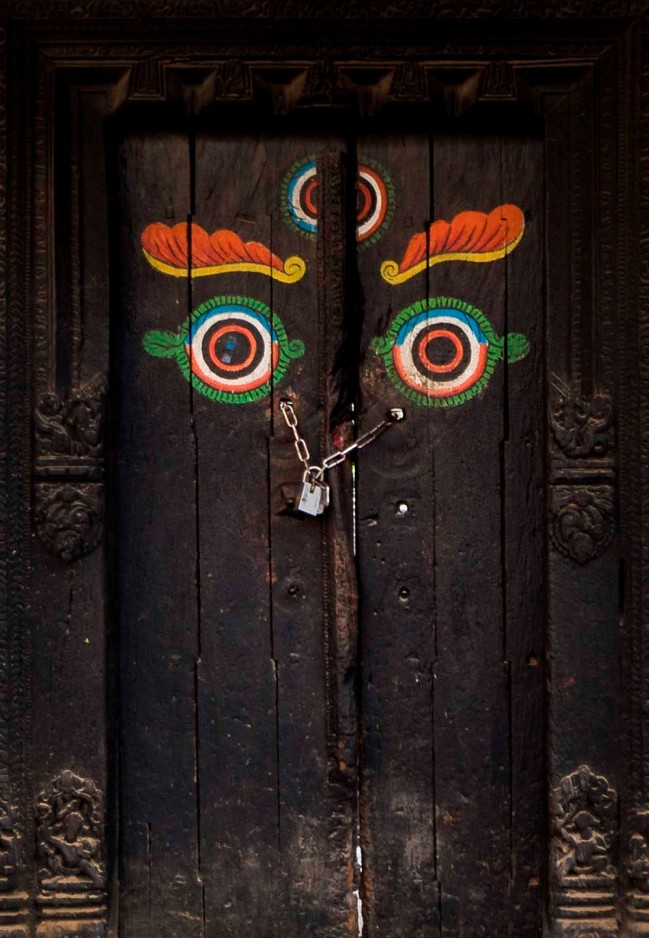South Asia Program fellows find focus at Cornell
By Megan DeMint
Delicate, feathered eyelashes in a green outline frame the orange irises of wide-awake eyes. Bushy orange eyebrows leave space for a third central eye. Taking a step back, these details take shape – the upper half of an uncanny face – on a door in Kathmandu.
Nipun Prabhakar is an independent photographer and architect from New Delhi and a visiting scholar in the Mario Einaudi Center for International Studies’ South Asia Program (SAP). For Prabhakar to find his focus on his photo essay “Portrait of Nepal through its Doors,” he needed the months of dedicated work time he has enjoyed at Cornell.
His time as a South Asian Studies fellow offers opportunities he couldn’t find elsewhere.
“For most of the academic fellowships, I am a textbook misfit,” he said. “The South Asia Program’s fellowship accommodates not just academics … but also writers, curators and artists.”
The two- to four-month fellowships support emerging scholars and creative people from Afghanistan, Bangladesh, Bhutan, India, Maldives, Nepal, Pakistan and Sri Lanka. This year’s cohort is the program’s third.
“The fellowship program was started to engage with innovative scholars, writers and artists who have not been recently exposed to the resources at a major American research university,” said Iftikhar Dadi, faculty director of SAP and associate professor of history of art in the College of Arts and Science. The benefits are bilateral for fellows and the Cornell community, Dadi said, including “individual and institutional partnerships, advances innovative work in the region and helps Cornell faculty and students to stay abreast of latest developments in these fields.”
When 2019 fellow Achyut Chetan learned of the fellowship, he was interested in the potential to access resources that are usually unavailable where he lives and works.
“I work in a rather marginalized part of South Asia, teaching some of the most deprived kids in a minor institution,” said Chetan, who teaches English at Santal Parganas College in Dumka, India.
This fall, Chetan is in the final stages of writing and revising a book that rediscovers India’s “founding mothers” – intellectuals and leaders in women’s organizations who shaped the Indian constitution, which was adopted in 1949.
Chetan said Cornell believed in the intellectual promise of his research and its implications as much as he did. “It is deeply reassuring,” he said, “to see that great institutions value academic excellence, irrespective of position, location or other markers.”
The South Asia Program’s past fellows have worked in diverse fields, ranging from art curation, poetry and theater to gender, climate change and photography.
Prabhakar’s interests lie in equally diverse topics, including photographic-anthropological documentation, migration and human interaction with built spaces. His photography is inspired by time spent in rural parts of India and Nepal as an architect serving displaced communities.
As he worked to retain local design symbology and aesthetics in Kathmandu, Nepal, he recognized the cultural importance of “one of the most important elements of the Nepali vernacular architecture: the door.”
The fellows have found community at Cornell.
“Though we work in entirely different fields, we have several common interests that we keep exploring together,” Chetan explained. “We have explored a lot of Cornell together, from its libraries to its theaters.”
With this flexibility to explore and pursue open-ended and cross-disciplinary work, Chetan and Prabhakar are jointly auditing classes, including game theory and psychology and cinema.
“My artistic projects and creative pursuits depend on the environment I am in,” Prabhakar said. “The environment of scholarship at Cornell gives me a chance to both deeply engage with and purposely divert from the research I am undertaking.”
In working with Chetan, Prabhakar said he has found a friend and mentor: “He has been a great help in showing me the different modes of academic engagement with one’s subject. I am learning a lot just by seeing the rigor he puts into his work.”
Both visiting scholars shared their projects with the Einaudi Center community, presenting in the SAP weekly seminar series. In the spring, Cornell will welcome a third visiting scholar – Kanchuka Dharmasiri, a senior lecturer in the English department at the University of Peradeniya in Sri Lanka.
Megan DeMint is a communication specialist in the Mario Einaudi Center for International Studies.
Media Contact
Get Cornell news delivered right to your inbox.
Subscribe

